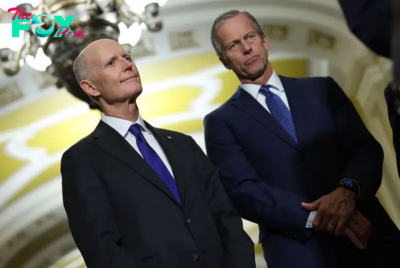Politics
Matt Gaetz Nomination Confirms Trump’s Revenge Talk Wasn’t Bluster
This article is part of The D.C. Brief, TIME’s Politics newsletter. Sign up here to get stories like this sent to your inbox.
Comb through just about any political nerd’s text chains in the last 48 hours and there is one profane piece of shorthand that likely appears repeatedly regardless of their political affiliation: WTF?
That’s been the general reaction throughout the first full week since Donald Trump started to form a government-in-waiting poised to deliver on his promised grievance-settling agenda. At first, the picks were novel, if garish. Sen. Marco Rubio of Florida as Secretary of State is an unexpected choice for an incoming President who has long scorned Rubio’s neocon worldview as folly. Neither South Dakota Gov. Kristi Noem as head of Homeland Security nor former Rep. Lee Zeldin in charge of the Environmental Protection Agency exactly comes off as an expert in the departments they are now set to lead.
Then came the announcements of Pete Hegseth and Tulsi Gabbard. The next President seriously wants a Fox News host as Secretary of Defense and a longstanding Russian sympathizer as Director of National Intelligence?
What the actual F?, indeed
But none of that prepared the public for the biggest bombshell thus far, one that prompted audible gasps from House members in a behind-closed-door meeting as they learned Wednesday that Trump planned to nominate Rep. Matt Gaetz as the next Attorney General.
In quick order, the “WTF?” texts were upgraded to “AYFKM?”
There are almost too many reasons for why the prospect of Gaetz as the nation’s top law enforcement official has stunned a Washington that was already bracing for Trump to make some outside-the-box Cabinet picks. Beyond the MAGA faithful who adore his epic trolling, Gaetz may be best known as the member of Congress who has spent years staring-down a secretive ethics panel probe into his own conduct vis a vis teens, cash, and sex. His colleagues dismiss him as an adolescent with a voting card, a walking embodiment of Trumpist impulses. The Justice Department even investigated whether Gaetz’s conduct violated any number of federal laws. Gaetz is now in line to take over that same Justice Department.
To make the whole story even seedier, Gaetz resigned from the House on Wednesday, reportedly days ahead of the House Ethics Committee planning to release a report that has long been a shouted whisper in Washington. While Gaetz has denied any wrongdoing and claimed he is being singled out as retribution for daring to question GOP Leadership, the bipartisan panel has quietly been building a report that could be released as soon as Friday. Typically, the Ethics Committee ends its probe if a member leaves their job because it no longer can punish a colleague for their deeds, but it also may be able to send its findings to the Justice Department or even the Senate, where Gaetz will face a tricky confirmation hearing.
But set aside all that innuendo and intrigue and consider solely Gaetz’s reputation as a member of Congress. Almost exactly a year ago, Gaetz had just ousted Speaker Kevin McCarthy from leadership, a move that stemmed from a personal grudge that to this day goes both ways. Gaetz quickly revealed he had no plans to get any other House Republican enough support to replace McCarthy as Speaker, leaving Congress immobilized for weeks as this self-iNFLicted drama played out. My editor flagged this paragraph from a D.C. Brief column from the time:
Most lawmakers, including many in the far-right Freedom Caucus, have had it with Gaetz. Whereas they once excused his antics, most are now just dismissing him as a show horse more interested in booking TV hits than passing legislation. “Charlatan” and “fraud” have been bandied around without reservation. “A smart guy without morals” was the savage assessment of one lawmaker. Even Gaetz’s normal enablers are growing weary of the headlines generated without regard for what the second-day story might look like.
What many in Washington are now worried about is that Gaetz didn’t win Trump’s approval in spite of the reputation laid out in the above paragraph, but because of it. Throughout his presidential campaign, Trump vowed revenge against those he considered enemies—Democrats, NeverTrumpers, journalists, academics, regulators, prosecutors—and left the threat of violence hanging in the mix. When former Republican Rep. Liz Cheney returned to the campaign trail in support of Trump’s rival, the former President suggested she should see if she still supported Kamala Harris when “guns are trained on her face.”
All through Washington Wednesday night, many were realizing that Gaetz may be the perfect person to implement Trump’s revenge agenda. “The hunted are becoming the hunters,” Trump ally and podcast provocateur Steve Bannon said, predicting Gaetz would send those who sought accountability for Trump and his allies to prison. Lawmakers—even those inclined to give Trump a pass—could not contain their contempt for the vote Trump was setting in motion.
Career prosecutors are horrified and contemplating their next steps. Plenty are reviewing the DOJ’s severance and separation policies. Mainstream normies wondered if there were ways to curtail any AG’s power, through congressional add-on, budget provisions, or just denying him the basics of parking spots. Even some Trump apologists sensed that Gaetz was a step too far and rationalized the announcement as a symbolic show of force intended to soften opposition to his real pick when it comes. Political insiders, too, mused that this could be a “false flag” operation to make the next choice more palatable.
So, yes. You are to be excused if this whole exercise seems rather irrational, hasty, reckless. Whereas the pick of loyalists can be understood, the selection to install Gaetz as the nation’s top cop is more than just running afoul of norms. It’s a signal to take Trump’s most offensive, anti-democratic claims over the last year deadly seriously. And, given a second chance, he seems ready to make the most of the largely unchecked power.
Senate Democrats are not going to entertain the faintest of realities that Gaetz can be confirmed, and plenty of Republicans were eager to call it a non-starter, even in a Trump-dominated Washington where Republicans have a relatively free hand to do as they wish. But Trump is setting up an early test of GOP pliability by suggesting he could skirt the Senate’s role in confirming his appointments altogether and allow Trump to stack his Cabinet while lawmakers stand in recess. Such recess appointments, while not uncommon, are often considered a short-term patch for specific nominees, not a wholesale strategy based on Senators abdicating their constitutional powers in stunning acts of complicity.
Yet, here we are. This is the incoming administration—at least as Trump sees it in his imagination and Republicans fear it in their nightmares. At least for now, all of Washington has to treat it as a serious play with dire consequences if it proves fruitful.
Make sense of what matters in Washington. Sign up for the D.C. Brief newsletter.
-

 Politics12h ago
Politics12h agoIndonesia president’s diplomatic dash takes in China and US − but a Trump presidency may see the aspiring regional powerhouse tilt more toward Beijing
-

 Politics12h ago
Politics12h agoProgressive Alameda County DA And San Francisco Mayor Take Election Ls
-

 Politics17h ago
Politics17h agoIn Thune, Senate Republicans Picked The Most Anti-MAGA Leader In The Mix
-

 Politics17h ago
Politics17h agoPete Hegseth’s Role in Trump’s Controversial Pardons of Men Accused of War Crimes
-

 Politics22h ago
Politics22h agoIn Oval Office, Biden Welcomes Trump, Who Plans to Unwind Biden’s Presidency
-

 Politics22h ago
Politics22h agoRepublican John Thune of South Dakota Is Elected the Next Senate Majority Leader
-

 Politics1d ago
Politics1d agoBiden is Sending Aid to Help Ukraine Keep Fighting Next Year, Blinken Says
-

 Politics1d ago
Politics1d agoHow Washington Is Reacting to Trump’s Pick of Fox News’ Pete Hegseth for Defense Secretary























